
Neotropical Biodiversity
Scope & Guideline
Unveiling the secrets of biodiversity in the Neotropics.
Introduction
Aims and Scopes
- Biodiversity Assessment and Conservation:
The journal emphasizes studies that assess biodiversity in various habitats, including flora and fauna, and highlight conservation issues and strategies. - Ecological Interactions and Dynamics:
Research that explores ecological relationships and dynamics within ecosystems, including predator-prey interactions, community structure, and species behavior. - Impact of Environmental Change:
Papers investigating the effects of climate change, habitat loss, and anthropogenic pressures on biodiversity and ecosystem health are a core focus. - Taxonomy and Systematics:
Contributions that enhance the understanding of species taxonomy, including descriptions of new species and revisions of existing classifications. - Ethnozoology and Traditional Knowledge:
The journal includes studies that document traditional ecological knowledge and practices of local communities regarding biodiversity. - Methodological Innovations in Biodiversity Research:
A focus on novel methodologies, including molecular techniques, remote sensing, and ecological modeling, to advance biodiversity research.
Trending and Emerging
- Climate Change Impact Studies:
There is a notable increase in research focusing on the impacts of climate change on biodiversity, particularly regarding endemic and vulnerable species. - Community Ecology and Assemblage Dynamics:
Emerging studies are increasingly investigating community dynamics, including species interactions and assemblage patterns, particularly in fragmented habitats. - Technological Integration in Biodiversity Studies:
The use of advanced technologies, including remote sensing and machine learning for biodiversity monitoring and data analysis, has gained popularity. - Conservation Genetics and Genomics:
Research in conservation genetics is on the rise, focusing on genetic diversity, population structure, and the implications for species conservation. - Urban Biodiversity and Human-Wildlife Interactions:
There is an emerging interest in studying biodiversity in urban settings and how human activities impact wildlife and ecosystem services.
Declining or Waning
- Invasive Species Studies:
Research specifically focused on invasive species and their impacts has decreased, possibly due to a broader focus on native biodiversity conservation. - Traditional Taxonomic Studies:
There has been a waning interest in purely traditional taxonomic studies without ecological context, as the field shifts towards integrated approaches that combine taxonomy with ecological and conservation insights. - Aquatic Biodiversity Research:
Although still present, studies specifically focused on freshwater ecosystems and aquatic biodiversity appear less frequent, indicating a potential shift towards terrestrial biodiversity topics. - Generalized Species Distribution Models:
The focus on generalized species distribution models without local ecological considerations is declining, as researchers increasingly prioritize context-dependent analyses. - Paleobiology and Historical Ecology:
Research related to paleobiological aspects or historical ecology has diminished, as contemporary ecological studies gain more relevance in current conservation discussions.
Similar Journals

Global Ecology and Conservation
Advancing ecological knowledge for a sustainable future.Global Ecology and Conservation, published by Elsevier, stands as a premier open-access journal dedicated to advancing the field of ecology and conservation science. Since its inception in 2014, the journal has facilitated the dissemination of high-quality research, fostering critical dialogue on ecosystem management, biodiversity preservation, and sustainability practices across the globe. With a remarkable ranking within the top quartiles (Q1) in various categories including Ecology, Evolution, Behavior and Systematics, and Nature and Landscape Conservation, it is positioned among the leading resources for researchers and professionals alike. The journal has garnered a notable impact, ranking #65 out of 721 in Ecology, and houses articles that are vital to understanding and addressing the pressing environmental challenges of our time. Available in an open-access format, researchers can freely access and share vital findings, promoting a collaborative approach to ecological research. Global Ecology and Conservation is not just a publication; it is a critical tool for innovation and advocacy in conservation, poised to inspire the next generation of environmental stewards.
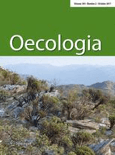
OECOLOGIA
Fostering Innovative Research in Ecological DynamicsOECOLOGIA is a prestigious journal dedicated to the interdisciplinary fields of ecology, evolution, behavior, and systematics, published by Springer. Established in 1968, this journal has consistently contributed to the scientific community, maintaining a strong impact factor reflected in its Q1 ranking within its category for 2023, and an impressive 79th percentile among 721 journals in the Scopus rank for Agricultural and Biological Sciences. With a commitment to advancing ecological knowledge and fostering innovative research, OECOLOGIA serves as a vital platform for researchers, professionals, and students exploring complex ecological dynamics and evolutionary processes. Although it does not offer open access, the journal remains dedicated to high-quality, peer-reviewed publications that inspire and inform the next generation of ecological science. For those interested in the latest trends and significant findings in biology and ecology, OECOLOGIA is an essential resource that continues to shape the discourse and understanding in these critical fields.
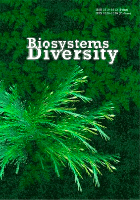
Biosystems Diversity
Connecting Scholars in the Quest for BiodiversityBiosystems Diversity is an esteemed open access journal published by the Oles Honchar Dnipro National University since 2009, based in Ukraine. Focusing on a wide array of topics within the fields of Ecology, Evolution, Behavior, and Systematics, the journal aims to foster the dissemination of cutting-edge research and innovative methodologies in understanding biodiversity and ecological interactions. With its ISSN 2519-8513 and E-ISSN 2520-2529, Biosystems Diversity has seen a consistent growth trajectory, earning a Q3 category for Ecology and a Q4 classification for Ecology, Evolution, Behavior and Systematics as of 2023, reflecting its dedication to high standards of scholarly excellence. The journal's rankings in Scopus solidify its relevance in the academic community, providing researchers and practitioners with vital insights into contemporary environmental challenges. As it converges towards its 2024 target, Biosystems Diversity continues to empower scientists, students, and professionals alike to explore new dimensions in the study of biological systems, offering crucial open access options for broader reach and engagement.
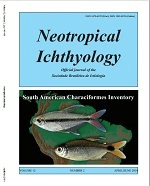
Neotropical Ichthyology
Advancing ichthyological knowledge in the heart of the Neotropics.Neotropical Ichthyology is a prestigious open-access journal published by the SOC BRASILEIRA ICTIOLOGIA, dedicated to advancing the field of ichthyology within the Neotropical region. Since its inception in 2003, the journal has provided a vital platform for researchers, professionals, and students to disseminate significant findings related to fish biology, ecology, and conservation. With an impact factor that is reflected in its impressive Q1 ranking in Animal Science and Zoology and Q2 rankings in both Aquatic Science and Ecology, Evolution, Behavior and Systematics, it stands as a leading resource for cutting-edge research. Located in Brazil, at the UNIV SAO PAULO, the journal not only contributes to scientific knowledge but also fosters collaboration among ichthyologists dedicated to the rich aquatic biodiversity of the Neotropical region, ensuring that critical insights into fish species, habitats, and conservation strategies are accessible to a global audience.

OIKOS
Advancing ecological knowledge for a sustainable future.OIKOS is a leading journal dedicated to the field of Ecology, Evolution, Behavior, and Systematics, published by WILEY in the United Kingdom. Since its inception in 1973, OIKOS has established itself as a vital platform for researchers seeking to advance their understanding of ecological interactions and evolutionary processes, with its impact reflected in its prestigious Q1 classification in the 2023 Scopus rankings. The journal's dedication to high-quality research is exemplified by its robust ranking of #106 out of 721 in the relevant categories, situating it within the top 15% of journals globally. With a commitment to disseminating influential findings, OIKOS encourages the open exchange of ideas among a diverse range of scholars, making it an essential resource for academics, professionals, and students alike. Whether you are interested in innovative ecological theories or applied research with real-world implications, OIKOS provides a rich repository of knowledge to inform and inspire your work.
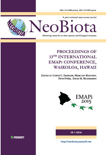
NeoBiota
Exploring the depths of biodiversity and conservation.NeoBiota, published by Pensoft Publishers in Bulgaria, is a preeminent Open Access journal dedicated to advancing knowledge in biodiversity, ecology, and conservation science. Since its inception in 2011, it has established itself as a pivotal platform for scholarly discourse, maintaining an impressive impact factor that places it in the Q1 quartile across multiple categories, including Animal Science and Zoology, Aquatic Science, and Ecology. With its articles indexed in leading databases and Scopus rankings that affirm its standing (e.g., rank #12 in Animal Science and Zoology), NeoBiota serves as a vital resource for researchers, professionals, and students. The journal emphasizes the synthesis of ecological modeling and evolutionary processes, fostering interdisciplinary collaboration and promoting rigorous research methodologies. Authors are encouraged to contribute their insights on biodiversity metrics, ecosystem dynamics, and the ecological implications of anthropogenic changes, making NeoBiota essential for anyone invested in the future of our planet's ecosystems. Discover the treasures of ecological scholarship through this influential journal.

Frontiers in Ecology and Evolution
Pioneering research at the intersection of ecology and evolution.Frontiers in Ecology and Evolution, published by FRONTIERS MEDIA SA, stands as a premier open-access journal dedicated to the exploration and discourse in the interdisciplinary fields of ecology and evolutionary biology. With its inception in 2013, this journal has rapidly ascended to a prestigious position, securing a Q1 ranking in both Ecology and Ecology, Evolution, Behavior and Systematics categories, reflecting its influential impact in the respective fields. Operative from Switzerland, Frontiers in Ecology and Evolution enables researchers, professionals, and students to access high-quality research without barriers, promoting collaboration and innovation. The journal covers a broad range of topics, from ecological dynamics to evolutionary strategies, facilitating profound insights that drive scientific advancement and understanding. With a remarkable position in Scopus rankings—ranking #218 in Ecology, Evolution, Behavior and Systematics and #145 in Environmental Science—this journal is essential for anyone keen on contributing to or staying updated with contemporary research in ecology and evolution.
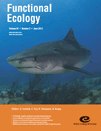
FUNCTIONAL ECOLOGY
Fostering Knowledge on the Interplay of Organisms and Their HabitatsFUNCTIONAL ECOLOGY is a premier journal published by WILEY that delves into the intricate relationships of organisms and their environments, addressing key themes in ecology, evolution, behavior, and systematics. Established in 1987, this influential publication has made strides in both foundational research and applied science, boasting a remarkable impact factor that positions it in the Q1 category for Ecology, Evolution, Behavior, and Systematics. With a Scopus ranking of #48 out of 721 in its field, it represents the cutting edge of ecological research, appealing to a diverse audience that includes researchers, professionals, and students striving to comprehend and address ecological challenges. Although the journal does not currently provide Open Access options, it remains a vital resource for those looking to deepen their understanding of functional ecology and its practical applications in sustainability and conservation. Join the community of scholars advancing ecological knowledge and its relevance in today's rapidly changing world.

Annual Review of Ecology Evolution and Systematics
Connecting Discoveries Across Ecological and Evolutionary LandscapesThe Annual Review of Ecology, Evolution, and Systematics, published by Annual Reviews, is a leading academic journal dedicated to advancing the understanding of ecological and evolutionary processes. With a commendable impact factor and impressive rankings—9th in both the Ecology, Evolution, Behavior and Systematics category and the Environmental Science category—this journal is recognized for its rigorous peer-reviewed articles that synthesize research findings across a wide range of topics within the fields of ecology and evolutionary biology. Established in 2003, this annual publication aims to provide researchers, professionals, and students with comprehensive insights into the latest developments and trends within these dynamic disciplines. By facilitating access to high-quality scholarly articles, the Annual Review of Ecology, Evolution, and Systematics continues to play a crucial role in fostering scientific discourse and discovery.
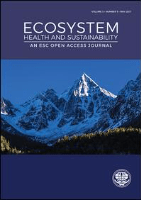
Ecosystem Health and Sustainability
Exploring the intersection of ecology and human well-being.Ecosystem Health and Sustainability, published by the American Association for the Advancement of Science, is a premier journal in the field of ecological research and sustainability. Established as an Open Access journal since 2015, it has made significant strides in disseminating impactful research that addresses contemporary challenges in ecosystem health within a global context. With an impressive impact factor reflected in its consistent placement in the Q1 category across multiple fields—including Ecology, Evolution, Behavior and Systematics, as well as Management, Monitoring, Policy, and Law—this journal serves as a vital resource for researchers, professionals, and students alike. Based in the United Kingdom, the journal has shown notable performance in Scopus rankings, positioning itself within the top percentiles across various ecological specialties. As it continues its convergence through 2024, Ecosystem Health and Sustainability is committed to fostering the exchange of knowledge and promoting the integration of science and policy to advance sustainable practices globally.